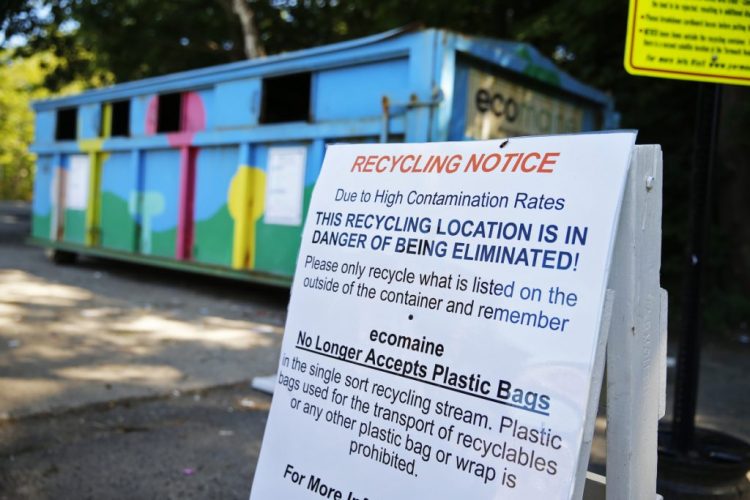Four Portland-area communities have hired summer interns to do curbside inspections and educate residents about “wish-cycling,” the costly habit of leaving nonrecyclable items such as plastic bags in the recycling bin.
Contamination in recycling streams contributed to a revenue deficit last year for ecomaine, the regional waste disposal cooperative, and forced communities such as Sanford to reject some recyclables and leave unsorted bins on the curb. Together with a steep price increase from China’s decision to ban U.S. recyclables, trash contamination contributed to a half-million-dollar shortfall for ecomaine last year, the waste management service said.
Now, Falmouth, Scarborough, South Portland and Windham are teaming up to teach residents what to put in their bins – and, just as importantly, what to leave out. A group of about 10 interns will start patrolling those communities the week of June 17, sticking colored tags on bins to grade residents’ sorting performance.
Green means a bin is good to go. Yellow means a few items don’t belong. Red means the load is too contaminated to pick up.
“We’re not anticipating too many red tags left on bins,” said Matt Grondin, communications manager for ecomaine, “but at the end of the day, if something is too contaminated, it costs us money, it costs the towns money, it costs everyone money, and there’s the possibility that they’ll be left behind.”
Hiring of the interns is finished for now, but communities may renew the program depending on its success, Grondin said. The jobs are paid, with each municipality setting its own rate. Most of the interns are college students, and they’ll head back to school in August.
Julie Rosenbach, South Portland’s sustainability director, said the city tested the program last summer with a single intern who paired with a resident to conduct inspections. Thanks to the city’s outreach to residents, the reception was positive, she said.
“I think a lot of people’s reaction is, ‘Wow, people are going to freak out if you’re looking in their bins,’ ” she said, but “oddly enough, I think more people are supportive of this than not.”
Rosenbach said the interns would look inside bins but not touch anything. They won’t take note of what people are throwing away – other than whether it can be recycled or not – and they’ll leave feedback so that residents can improve their sorting.
This summer, South Portland plans to send out four interns twice a week. They’ll cover routes that include parts of the neighborhoods of Loveitts Field, Willard Beach, Ferry Village, Pleasantdale and Ligonia. The interns will work roughly 20 hours a week at $12 an hour, with mileage expenses also reimbursed.
Municipalities across the state had some success educating the public over the past year. Statewide, average contamination rates fell from about 16 percent to between 11 and 12 percent, Grondin said. Some of the lowest rates come from communities such as Bridgton, which posts an employee at its transfer station to tell residents what they can recycle.
Copy the Story Link
Send questions/comments to the editors.



Success. Please wait for the page to reload. If the page does not reload within 5 seconds, please refresh the page.
Enter your email and password to access comments.
Hi, to comment on stories you must . This profile is in addition to your subscription and website login.
Already have a commenting profile? .
Invalid username/password.
Please check your email to confirm and complete your registration.
Only subscribers are eligible to post comments. Please subscribe or login first for digital access. Here’s why.
Use the form below to reset your password. When you've submitted your account email, we will send an email with a reset code.